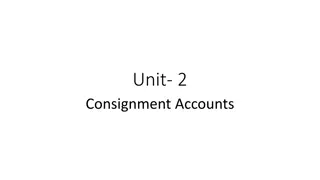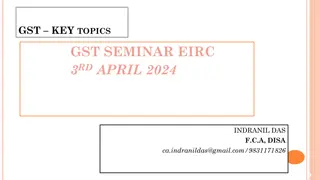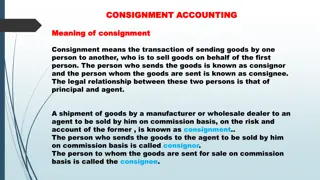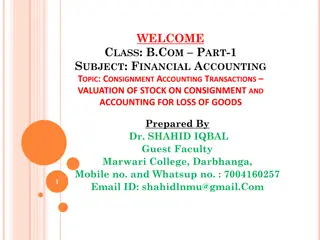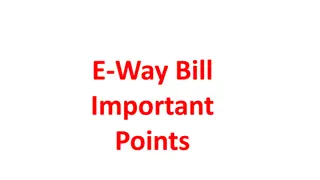Understanding Consignment Accounts in Business
Consignment accounts involve the sending of goods by a consignor to a consignee for sale on the consignor's behalf. The consignor remains the owner of the goods until they are sold, and the consignee sells the goods, collects money from customers, and receives commissions. Various types of commissio
9 views • 22 slides
Understanding E-Way Bill Applicability and Practical Issues in GST
The seminar discusses key topics related to E-Way Bill in GST, including its applicability, notification changes, case studies, consignment note, and scenarios requiring E-Way Bill generation. Various aspects such as transportation, movement, and document requirements are covered to provide clarity
0 views • 39 slides
Understanding Consignment in Accounting
Consignment in accounting involves sending goods from a consignor to a consignee for sale on commission basis. The consignor retains ownership until the goods are sold. The relationship is that of principal and agent, with the consignee handling sales and remitting net proceeds. Important terms incl
1 views • 7 slides
Valuation and Accounting for Unsold Stock in Consignment Transactions
Valuation and accounting for unsold stock in consignment transactions is crucial for determining true profit or loss. The cost of consigned goods plus proportionate expenses must be considered. Recurring and non-recurring expenses play a significant role in valuing closing stock. The value of unsold
1 views • 10 slides
Understanding Important Points about E-Way Bill
Learn crucial details about E-way bills, including generation rules, document limitations, validity period, editing options, and multiple mode transportation updates. Explore nuances like one e-way bill per consignment, handling of multiple documents, and updates for different Bill to and Ship to ad
1 views • 7 slides
